最新英语比较级最高级练习题
中考英语比较级和最高级练习题40题(答案解析)
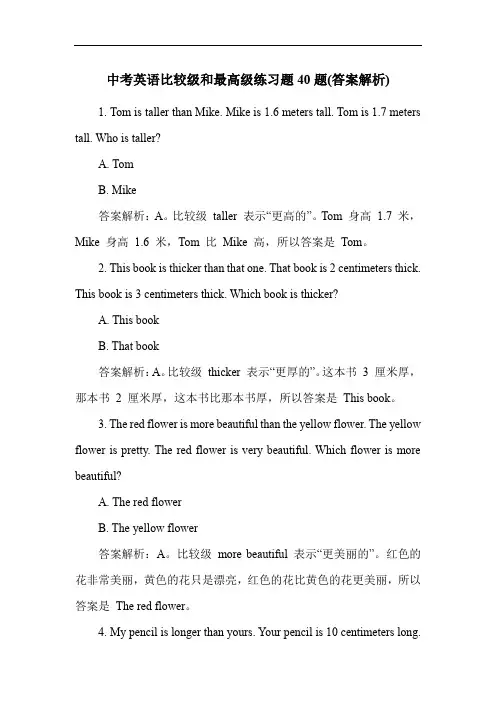
中考英语比较级和最高级练习题40题(答案解析)1. Tom is taller than Mike. Mike is 1.6 meters tall. Tom is 1.7 meters tall. Who is taller?A. TomB. Mike答案解析:A。
比较级taller 表示“更高的”。
Tom 身高1.7 米,Mike 身高1.6 米,Tom 比Mike 高,所以答案是Tom。
2. This book is thicker than that one. That book is 2 centimeters thick. This book is 3 centimeters thick. Which book is thicker?A. This bookB. That book答案解析:A。
比较级thicker 表示“更厚的”。
这本书3 厘米厚,那本书2 厘米厚,这本书比那本书厚,所以答案是This book。
3. The red flower is more beautiful than the yellow flower. The yellow flower is pretty. The red flower is very beautiful. Which flower is more beautiful?A. The red flowerB. The yellow flower答案解析:A。
比较级more beautiful 表示“更美丽的”。
红色的花非常美丽,黄色的花只是漂亮,红色的花比黄色的花更美丽,所以答案是The red flower。
4. My pencil is longer than yours. Your pencil is 10 centimeters long.My pencil is 12 centimeters long. Which pencil is longer?A. My pencilB. Your pencil答案解析:A。
高一英语比较级和最高级练习题20题(带答案)
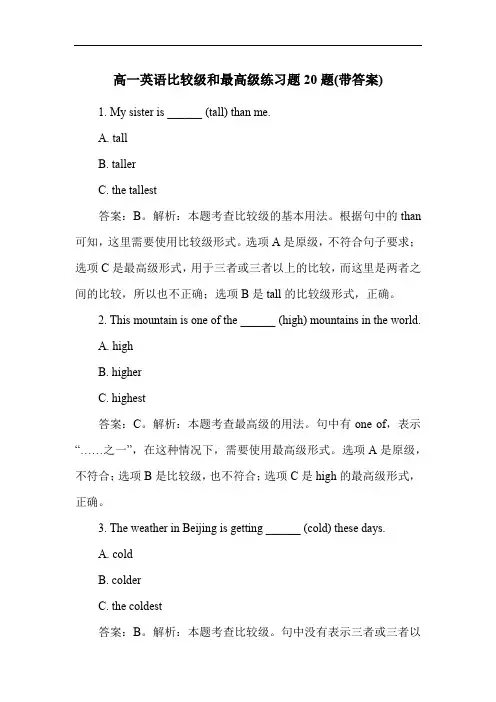
高一英语比较级和最高级练习题20题(带答案)1. My sister is ______ (tall) than me.A. tallB. tallerC. the tallest答案:B。
解析:本题考查比较级的基本用法。
根据句中的than 可知,这里需要使用比较级形式。
选项A是原级,不符合句子要求;选项C是最高级形式,用于三者或三者以上的比较,而这里是两者之间的比较,所以也不正确;选项B是tall的比较级形式,正确。
2. This mountain is one of the ______ (high) mountains in the world.A. highB. higherC. highest答案:C。
解析:本题考查最高级的用法。
句中有one of,表示“……之一”,在这种情况下,需要使用最高级形式。
选项A是原级,不符合;选项B是比较级,也不符合;选项C是high的最高级形式,正确。
3. The weather in Beijing is getting ______ (cold) these days.A. coldB. colderC. the coldest答案:B。
解析:本题考查比较级。
句中没有表示三者或三者以上比较的提示词,只是说天气变得比之前冷了,是两者之间的比较,所以要用比较级。
选项A是原级,不合适;选项C是最高级,不符合题意;选项B是cold的比较级,正确。
4. Tom's room is ______ (big) than mine.A. bigB. biggerC. the biggest答案:B。
解析:根据句中的than可知是两者比较,要用比较级形式。
选项A是原级,不符合要求;选项C是最高级,用于三者或三者以上比较,这里是Tom的房间和我的房间比较,是两者之间,所以选项B正确。
5. Which is ______ (far), the moon or the sun from the earth?A. farB. fartherC. the farthest答案:B。
中考英语比较级和最高级变化练习题50题(带答案)
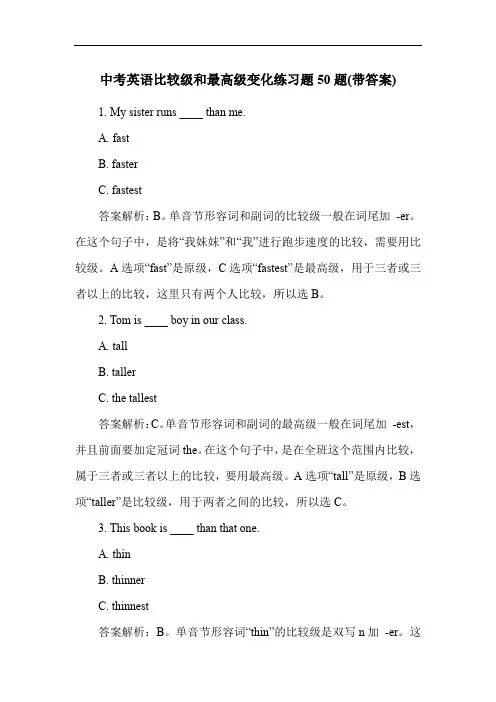
中考英语比较级和最高级变化练习题50题(带答案)1. My sister runs ____ than me.A. fastB. fasterC. fastest答案解析:B。
单音节形容词和副词的比较级一般在词尾加-er。
在这个句子中,是将“我妹妹”和“我”进行跑步速度的比较,需要用比较级。
A选项“fast”是原级,C选项“fastest”是最高级,用于三者或三者以上的比较,这里只有两个人比较,所以选B。
2. Tom is ____ boy in our class.A. tallB. tallerC. the tallest答案解析:C。
单音节形容词和副词的最高级一般在词尾加-est,并且前面要加定冠词the。
在这个句子中,是在全班这个范围内比较,属于三者或三者以上的比较,要用最高级。
A选项“tall”是原级,B选项“taller”是比较级,用于两者之间的比较,所以选C。
3. This book is ____ than that one.A. thinB. thinnerC. thinnest答案解析:B。
单音节形容词“thin”的比较级是双写n加-er。
这里是两本书之间的比较,要用比较级。
A选项“thin”是原级,C选项“thinnest”是最高级,用于三者或三者以上的比较,所以选B。
4. Among all the fruits, I think the apple is ____.A. sweetB. sweeterC. the sweetest答案解析:C。
单音节形容词“sweet”的最高级是在词尾加-est,并且前面加the。
这里是在所有水果中比较,属于三者或三者以上的比较,要用最高级。
A选项“sweet”是原级,B选项“sweeter”是比较级,用于两者之间的比较,所以选C。
5. He jumps ____ in his team.A. highB. higherC. the highest答案解析:C。
中考英语比较级和最高级练习题40题(带答案)
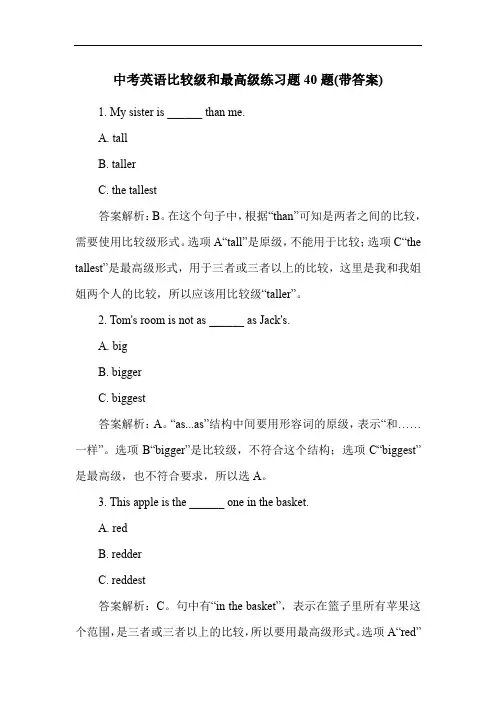
中考英语比较级和最高级练习题40题(带答案)1. My sister is ______ than me.A. tallB. tallerC. the tallest答案解析:B。
在这个句子中,根据“than”可知是两者之间的比较,需要使用比较级形式。
选项A“tall”是原级,不能用于比较;选项C“the tallest”是最高级形式,用于三者或三者以上的比较,这里是我和我姐姐两个人的比较,所以应该用比较级“taller”。
2. Tom's room is not as ______ as Jack's.A. bigB. biggerC. biggest答案解析:A。
“as...as”结构中间要用形容词的原级,表示“和……一样”。
选项B“bigger”是比较级,不符合这个结构;选项C“biggest”是最高级,也不符合要求,所以选A。
3. This apple is the ______ one in the basket.A. redB. redderC. reddest答案解析:C。
句中有“in the basket”,表示在篮子里所有苹果这个范围,是三者或三者以上的比较,所以要用最高级形式。
选项A“red”是原级;选项B“redder”是比较级,用于两者之间的比较,所以答案是C。
4. Which is ______, the sun, the moon or the earth?A. bigB. biggerC. the biggest答案解析:C。
这里比较的对象是太阳、月亮和地球,是三者之间的比较,所以要用最高级形式。
选项A“big”是原级,不能用于这种比较;选项B“bigger”是比较级,用于两者之间的比较,所以选C。
5. My father is much ______ than my mother.A. strongB. strongerC. the strongest答案解析:B。
高一英语比较级和最高级练习题40题
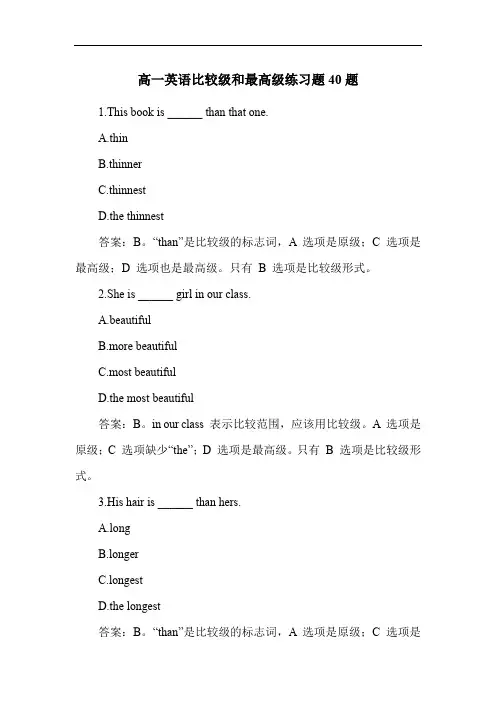
高一英语比较级和最高级练习题40题1.This book is ______ than that one.A.thinB.thinnerC.thinnestD.the thinnest答案:B。
“than”是比较级的标志词,A 选项是原级;C 选项是最高级;D 选项也是最高级。
只有B 选项是比较级形式。
2.She is ______ girl in our class.A.beautifulB.more beautifulC.most beautifulD.the most beautiful答案:B。
in our class 表示比较范围,应该用比较级。
A 选项是原级;C 选项缺少“the”;D 选项是最高级。
只有B 选项是比较级形式。
3.His hair is ______ than hers.A.longB.longerC.longestD.the longest答案:B。
“than”是比较级的标志词,A 选项是原级;C 选项是最高级;D 选项也是最高级。
只有B 选项是比较级形式。
4.The box is ______ than that one.A.heavyB.heavierC.heaviestD.the heaviest答案:B。
“than”是比较级的标志词,A 选项是原级;C 选项是最高级;D 选项也是最高级。
只有B 选项是比较级形式。
5.My room is ______ than yours.A.smallB.smallerC.smallestD.the smallest答案:B。
“than”是比较级的标志词,A 选项是原级;C 选项是最高级;D 选项也是最高级。
只有B 选项是比较级形式。
6.Tom is ______ than his brother.A.tallB.tallerC.tallestD.the tallest答案:B。
“than”是比较级的标志词,A 选项是原级;C 选项是最高级;D 选项也是最高级。
高三英语比较级和最高级练习题40题(带答案)
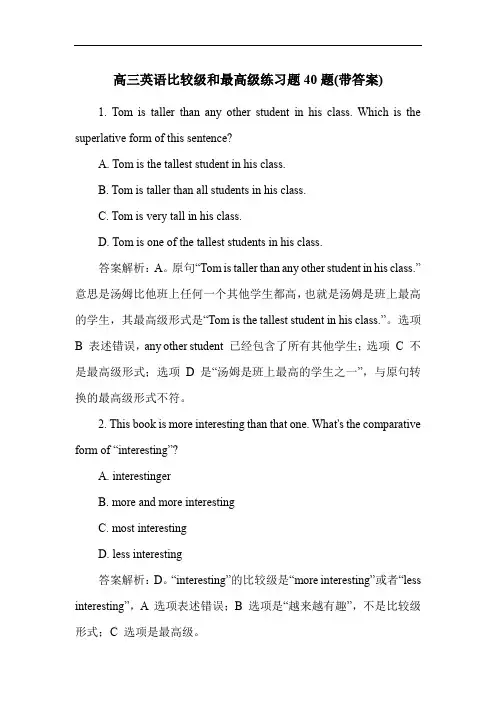
高三英语比较级和最高级练习题40题(带答案)1. Tom is taller than any other student in his class. Which is the superlative form of this sentence?A. Tom is the tallest student in his class.B. Tom is taller than all students in his class.C. Tom is very tall in his class.D. Tom is one of the tallest students in his class.答案解析:A。
原句“Tom is taller than any other student in his class.”意思是汤姆比他班上任何一个其他学生都高,也就是汤姆是班上最高的学生,其最高级形式是“Tom is the tallest student in his class.”。
选项B 表述错误,any other student 已经包含了所有其他学生;选项C 不是最高级形式;选项D 是“汤姆是班上最高的学生之一”,与原句转换的最高级形式不符。
2. This book is more interesting than that one. What's the comparative form of “interesting”?A. interestingerB. more and more interestingC. most interestingD. less interesting答案解析:D。
“interesting”的比较级是“more interesting”或者“less interesting”,A 选项表述错误;B 选项是“越来越有趣”,不是比较级形式;C 选项是最高级。
3. Mary runs faster than Lily. Which is the superlative form of this sentence?A. Mary runs the fastest.B. Mary runs very fast.C. Lily runs faster than Mary.D. Mary is one of the fastest runners.答案解析:A。
2024年初一英语比较级和最高级练习题30题
2024年初一英语比较级和最高级练习题30题1.Jack is taller than Tom. Tom is shorter than Mike. Who is the tallest?A.JackB.TomC.Mike答案:C。
解析:根据题目可知Jack 比Tom 高,Tom 比Mike 矮,所以Mike 最高。
比较级taller 和shorter 用于两者之间的比较,最高级tallest 用于三者及以上的比较。
2.Lily's hair is longer than Lucy's. Lucy's hair is shorter than Mary's. Who has the shortest hair?A.LilyB.LucyC.Mary答案:B。
解析:Lily 的头发比Lucy 长,Lucy 的头发比Mary 短,所以Lucy 的头发最短。
比较级longer 和shorter 用于两者之间的比较。
3.The book is thicker than that one. That one is thinner than another one. Which one is the thinnest?A.The first bookB.The second oneC.The third one答案:C。
解析:这本书比那一本厚,那一本比另一本薄,所以第三本最薄。
比较级thicker 和thinner 用于两者之间的比较。
4.The apple is bigger than the orange. The orange is smaller than the pear. Which one is the biggest?A.The appleB.The orangeC.The pear答案:C。
解析:苹果比橘子大,橘子比梨小,所以梨最大。
比较级bigger 和smaller 用于两者之间的比较。
中考英语比较级和最高级判断超级高级练习题40题
中考英语比较级和最高级判断超级高级练习题40题1. Tom is taller than Mike. Jack is taller than Tom. Who is the tallest?A. TomB. MikeC. Jack答案:C。
本题中,已知Tom 比Mike 高,Jack 比Tom 高,所以Jack 最高。
2. This book is more interesting than that one. Which one is less interesting?A. This bookB. That bookC. Can't tell答案:B。
因为这本书比那本书更有趣,所以那本书没这本书有趣。
3. Lucy is more beautiful than Lily. Who is less beautiful?A. LucyB. LilyC. Can't tell答案:B。
Lucy 比Lily 漂亮,所以Lily 没Lucy 漂亮。
4. The red car is faster than the blue car. Which car is slower?A. The red carB. The blue carC. Can't tell答案:B。
红色车比蓝色车快,所以蓝色车慢。
5. My room is bigger than yours. Whose room is smaller?A. My roomB. Your roomC. Can't tell答案:B。
我的房间比你的大,所以你的房间小。
6. The apple is sweeter than the orange. Which one is less sweet?A. The appleB. The orangeC. Can't tell答案:B。
苹果比橘子甜,所以橘子没苹果甜。
7. Tom runs faster than Mike. Who runs slower?A. TomB. MikeC. Can't tell答案:B。
《英语比较级和最高级练习题:基础填空、选择、句子改写及答案解析》
一、基础填空练习题(20题)1.This book is ________ (interesting) than that one.答案:more interesting。
解析:interesting是多音节形容词,比较级要用more + 形容词原级的形式。
2.Tom is ________ (tall) of the two boys.答案:the taller。
解析:表示“两者中较……的一个”,要用the + 比较级。
3.My sister sings ________ (well) than I.答案:better。
解析:well的比较级是better,用于两者比较。
4.The weather in Beijing is getting ________ (cold).答案:colder。
解析:get + 比较级,表示“变得更……”。
5.Which is ________ (big), the sun or the moon?答案:bigger。
解析:太阳和月亮两者比较大小,big是单音节形容词,比较级直接加- er。
6.She is ________ (careful) than her brother.答案:more careful。
解析:careful是多音节形容词,比较级是more careful。
7.He runs ________ (fast) in his class.答案:the fastest。
解析:in his class表示范围,在这个范围内他跑得最快,要用最高级,fast的最高级是the fastest。
8.The red apple is ________ (sweet) than the green one.答案:sweeter。
解析:根据than可知是比较级,sweet的比较级是sweeter。
9.My room is ________ (clean) than yours.答案:cleaner。
中考英语比较级和最高级练习题40题
中考英语比较级和最高级练习题40题1.This book is ____ than that one.A.thinB.thinnerC.thinnestD.the thinnest答案:B。
本题考查形容词比较级的用法。
thin 的比较级是thinner,最高级是thinnest。
在两者比较时用比较级,这里是this book 和that one 比较,所以用thinner。
A 选项是原级;C 选项是最高级,但没有给出三个及以上的比较对象;D 选项是最高级且前面多了the。
2.My sister is ____ than me.A.tallB.tallerC.tallestD.the tallest答案:B。
tall 的比较级是taller,最高级是tallest。
这里是“我”和“我的姐姐”比较,用比较级。
A 选项是原级;C 和D 选项是最高级,不符合语境。
3.The blue car is ____ than the red one.A.fastB.fasterC.fastestD.the fastest答案:B。
fast 的比较级是faster,最高级是fastest。
这里是蓝色汽车和红色汽车比较,用比较级。
A 选项是原级;C 和D 选项是最高级,这里只有两者比较。
4.Tom is ____ than his brother.A.strongB.strongerC.strongestD.the strongest答案:B。
strong 的比较级是stronger,最高级是strongest。
这里是Tom 和他的哥哥比较,用比较级。
A 选项是原级;C 和D 选项是最高级,不符合语境。
5.The apple is ____ than the orange.A.bigB.biggerC.biggestD.the biggest答案:B。
big 的比较级是bigger,最高级是biggest。
这里是苹果和橘子比较,用比较级。
- 1、下载文档前请自行甄别文档内容的完整性,平台不提供额外的编辑、内容补充、找答案等附加服务。
- 2、"仅部分预览"的文档,不可在线预览部分如存在完整性等问题,可反馈申请退款(可完整预览的文档不适用该条件!)。
- 3、如文档侵犯您的权益,请联系客服反馈,我们会尽快为您处理(人工客服工作时间:9:00-18:30)。
比较级、最高级练习题一.用所给形容词和副词的适当级填空:1.Tom is (lazy) student in our class.2.There are (few) books in this library than in that one.3.I have (little) free time than he.4.Mary is (young) than her husband.5.My watch runs (fast ) than his.6.The days are (long) in summer than in winter.7.This box is (large) one in the room.8.He knows (many) people than you.9.This box is (heavy) than that one.10.This film is (interesting) I have ever seen.11.It rains (often) in Shanghai than in Beijing.12.He made (many) mistakes than I.13.Her family is (rich) in the room.14.Fudan University is (famous) than our college.15.This road is (wide) than that street.16.The room is (bright) than mine.17.Your book is (thick) than Tom’s.18.The water in this river looks (dirty) than in that one.19.This is (good) book that I have ever seen.20.He arrived (early) today than yesterday.二.用much或many ,little 或few填空1. There are buses in London.2. I haven’t got time for study.3. Please don’t make so noise.4. Jan doesn’t know people in London and hasn’t got friends there.5. I don’t like butter on my bread.6. Hob said he had money and went to dances.7. There are only a cigarettes in the box. I had too time to buy any today.8. There is only a tea left in the teapot.9. Jane gave me a help with my work.10. Your homework is better than usual, you have only a mistakes.三、选择正确答案1. Now telephones are very popular and they are much than before.A. cheapB. cheaperC. cheapestD. the cheapest2. The busier he is, the he feels.A. happilyB. happyC. happierD. more happy3.—Remember, class. You work, result you’ll get.--We know, Miss Read.A. The better; the harder B The harder; the betterC. The hard; the harderD. The harder; the good4. Sorry, I took your MP3 by mistake. I’ll be careful next time.A. mostB. moreC. much5.—Who did it better, Bill or Henry?--I think Bill did just Henry.A. as well asB. as good asC. as better, asD. more badly, than6. The doctor told Mary to eat vegetables and meat because she was getting fatter and fatter.A. much; littleB. more; lessC. many; fewD. more; fewer7. There is still water in the bottle. It’s enough for both of us.A. litterB. a little C few D. a few8. Things are much on the moon on the earth.A. much lighter; thanB. much heavier; thanC. as heavy; asD. not so light; as在英语中通常用下列方式表示的词:在形容词或副词前加more(如more natural,more clearly )或加后缀-er(newer,sooner )。
典型的是指形容词或副词所表示的质、量或关系的增加。
英语句子中,将比较两个主体的方法叫做“比较句型”。
其中,像“A比B更……”的表达方式称为比较级;而“A最……”的表达方式则称为最高级。
组成句子的方式是将形容词或副词变化成比较级或最高级的形态。
英语比较级和最高级的用法一、形容词、副词的比较级和最高级的构成规则1.一般单音节词和少数以-er,-ow结尾的双音节词,比较级在后面加-er,最高级在后面加-est;(1)单音节词如:small→smaller→smallest short→shorter→shortesttall→taller→tallest great→greater→greatest(2)双音节词如:clever→cleverer→cleverest narrow→narrower→narrowest2.以不发音e结尾的单音节词,比较在原级后加-r,最高级在原级后加-st;如:large→larger→largest nice→nicer→nicest able→abler→ablest3.在重读闭音节(即:辅音+元音+辅音)中,先双写末尾的辅音字母,比较级加-er,最高级加-est;如:big→bigger→biggest hot→hotter→hottest fat→fatter→fattest4.以“辅音字母+y”结尾的双音节词,把y改为i,比较级加-er,最高级加-est;如:easy→easier→easiest heavy→heavier→heaviestbusy→busier→busiest happy→happier→happiest5.其他双音节词和多音节词,比较级在前面加more,最高级在前面加most;如:beautiful→more beautiful→most beautifuldifferent→more different→most differenteasily→more easily→most easily注意:(1)形容词最高级前通常必须用定冠词the,副词最高级前可不用。
例句:The Sahara is the biggest desert in the world.(2) 形容词most前面没有the,不表示最高级的含义,只表示"非常"。
It is a most important problem.=It is a very important problem.6.有少数形容词、副词的比较级和最高级是不规则的,必须熟记。
如:good→better→best well→better→bestbad→worse→worst ill→worse→worstold→older/elder→oldest/eldestmany/much→more→most little→less→leastfar →further/farther→ furthest/farthest二、形容词、副词的比较级和最高级的用法1.“A + be +形容词比较级+ than + B”意思为“A比B更……”。
如:This tree is taller than that one. 这棵树比那棵树高。
注意:①在含有连词than的比较级中,前后的比较对象必须是同一范畴,即同类事物之间的比较。
②在比较级前面使用much,表示程度程度“强得多”。
如:A watermelon is much bigger than an apple.③ very, quite一般只能修饰原级,不能修饰比较级。
2.“比较级+ and + 比较级”或“more and more +原级”表示“越来越……”如:It becomes warmer and warmer when spring comes.春天来了,天气变得越来越暖和了。
It is getting cooler and cooler.天气越来越凉爽。
The wind became more and more heavily.风变得越来越大。
Our school is becoming more and more beautiful.我们的学校变得越来越美丽。
3.在含有or的选择疑问句中,如果有两者供选择,前面的形容词要用比较级形式。
如:Who is taller,Tim or Tom? 谁更高,Tim还是Tom?4. “the +比较级……, the+比较级”,表示“越……越……”。
The more money you make, the more you spend.钱你赚得越多,花得越多。
The sooner,the better.越快越好。
5. 表示倍数的比较级用法:①. A is …times the size /height/length/width of B.如:The new building is three times the height of the old one.这座新楼比那座旧楼高三倍。
